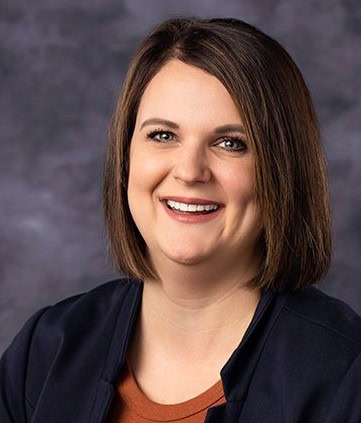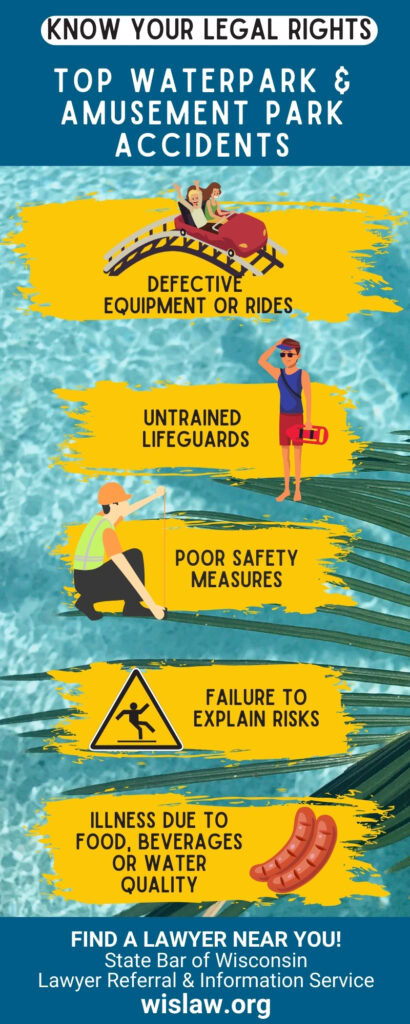Know Your Legal Rights is a bi-monthly column distributed by the State Bar of Wisconsin. It is written by members of the State Bar of Wisconsin’s Lawyer Referral and Information Service (LRIS), which connects Wisconsin residents with lawyers throughout the state. To find an attorney in your area, visit wislaw.org.
Injury Statistics and the Likelihood of Being Injured

Wisconsin is home to the “Waterpark Capital of the World,” the Wisconsin Dells. The Dells boast the largest concentration of indoor and outdoor waterparks on Earth – over 20 different parks. The Dells are also home to the third largest waterpark in the world, Noah’s Ark Water Park.
Many of Wisconsin’s waterparks also have amusement parks inside, replete with roller coasters, Ferris wheels, and more.
Waterparks and amusement park rides offer the allure of fun for all ages. Most park-goers assume that the rides are safe, concluding they wouldn’t be permitted to board these tall and twisty rides if they hadn’t been inspected and made safe by professionals.
However, in 2016 the U.S. Consumer Protection Safety Commission estimated that the number of U.S. emergency room visits for amusement ride-related injuries exceeded 30,000 annually. Children ages 5-14 suffer about 40% of ride-related injuries at these parks.
Two people have died and at least 75 have been hurt at Wisconsin water and amusement parks between 2006 and 2016.
In general, you are unlikely to be injured at an amusement park, but waterpark-related injuries have been increasing annually by about 5%, since 2010.

How Injuries Commonly Occur
Injuries can occur due to a variety of factors, but most commonly they include:
- Defective equipment or rides
- Negligent or untrained lifeguards or other staff
- Lack of supervision for waterpark patrons
- Poor or unimplemented safety measures
- Failure by the waterpark to explain risks
- Failure to meet applicable safety requirements
- Illness due to food, beverages, or water quality
Is the Waterpark Responsible for my Injuries?
Property owners have a responsibility to keep their premises safe for waterpark guests. This means that all areas (pools, rides, cafeterias, lobbies, etc.) must be maintained in a reasonably safe manner, such that hazards to guests are eliminated where possible.
However, if you are injured it doesn’t necessarily mean the waterpark is responsible. The waterpark owner must have notice of the hazard to be found liable for injuries caused by it. And, the waterpark must have failed to act or acted unreasonably in order to be found liable.
Contributory Negligence
Park owners are not the only ones required by law to act reasonably. Guests, too, must follow the park’s rules to ensure their own safety. If guests are partially responsible for causing their own injury due to a lack of care/reasonableness, then they may be deemed “contributorily negligent.” Contributory negligence can reduce or eliminate the amount of compensation an injured person is entitled to receive
Liability Waivers Can Be Challenged
Many amusement parks require guests to sign liability waivers, waiving all rights to bring a claim against the waterpark owner in the event of an injury. Don’t assume that just because you signed one you are barred from bringing a claim. Courts disfavor these types of waivers. A qualified attorney experienced in amusement park injuries can contest the validity of the waiver in court.
Conclusion
Thankfully, the statistics seem to be on our side in that the chances of incurring a serious injury at a waterpark are unlikely. But injuries and deaths do happen. If you choose to ride amusement park rides or patronize a waterpark, follow these safety guidelines, especially when it comes to supervising children:
- Follow all height, age, weight and health restrictions posted on the ride.
• Follow any special seating order and/or loading instructions.
• Always use safety equipment such as seat belts and safety bars.
• Make sure children keep hands and feet inside the ride at all times.
• Know your child. If you don’t think he/she will be able to follow the rules, keep him/her off the ride.
• Trust your instincts. If you are worried about the safety of the ride, choose a different activity.
Kate Bosworth is a partner at Doar Drill & Skow in New Richmond, Wisconsin. Doar Drill and Skow is a litigation firm, focused primarily on personal injury work. Kate has handled many types of personal injury cases, including waterpark injury accidents. To find an attorney near you, contact the State Bar of Wisconsin Lawyer Referral and Information Service, which connects Wisconsin residents with lawyers throughout the state. Learn more at wislaw.org.



